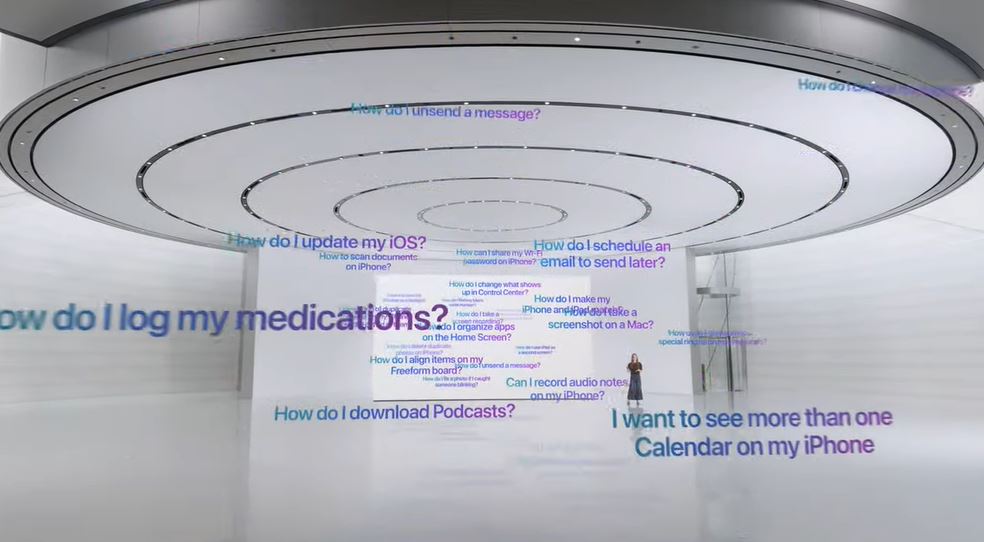Apple reveals Apple Intelligence as its gambit in the personal AI arena
Here's what we know about the newly unveiled Apple Intelligence

Apple has unveiled its own spin of Artificial Intelligence (AI) - and it's called Apple Intelligence. As expected, it was unveiled at WWDC 2024.
Here's everything we know so far about Apple Intelligence, and how it integrates with Siri and other Apple products.
Apple Intelligence will be free for users with iOS 18, iPadOS 18 and macOS 15 Sequoia - all operating updates announced at WWDC 2024.
Bringing Apple Intelligence to iPhone, iPad, and Mac
Apple has finally formally acknowledged that there's a bit of a generative AI storm raging outside and presented its own AI effort, Apple Intelligence, as well as new integration of existing third-party generative AI products. Apple declared that it intended its AI to be powerful, intuitive to use, deeply integrated into its devices (including at the hardware level), understanding of your personal circumstances, and built to respect your privacy from the ground up.
As presented by Craig Federighi, Senior VP of Software Engineering, Apple Intelligence is meant to go beyond existing 'impressive chat tools' to really understand you and to be able to help you in ways that are most relevant depending on what you're doing.
@techradar ♬ original sound - TechRadar
What Apple Intelligence will be capable of
Described as a 'personal intelligence system' that can operate across your iPhone, iPad, and Mac devices, Apple Intelligence uses the generative AI models in combination with your personal context.
It will be deeply woven into iOS 18, iPadOS 18, and macOS Sequoia, including at the hardware level. It's designed to make use of Apple silicon processors' capabilities to be able to process and create language and images, take actions on your behalf across apps, and speed up your everyday tasks.
Get daily insight, inspiration and deals in your inbox
Sign up for breaking news, reviews, opinion, top tech deals, and more.
Apple also went into some detail about keeping Apple Intelligence private, unveiling its new practice of Private Cloud Compute which enables your device to run larger models if needed thanks to special Apple Silicon servers while keeping your data secure. Apple also proclaimed that your data will never be stored and won't be accessible to Apple, but it will be accessible to independent security experts who can verify its privacy.
Incorporating Apple Intelligence on-device
These capabilities will be infused into Siri, Apple's trademark voice assistant, making it smarter and better at understanding. Apple Intelligence will also be used to ramp up writing assistance and creative generation across a number of apps like Mail, Photos, and Notes.
The other big piece of news we learned was that ChatGPT and other major AI models will be able to be used in sync with Apple Intelligence, intended to be seamless and feel like a natural part of using AI on Apple products.
Apple Intelligence will be available for free starting with iOS 18, iPad 18, and macOS Sequoia for Apple devices that have the necessary hardware.
This means your device will have to have an Apple silicon chip (M1, M2, M3, or M4) or the A17 Pro chipset. This means that many existing Mac devices can run Apple Intelligence, but the current newest iPhones can't just yet.
Find out more in detail about how Apple Intelligence will work and what devices can use it in our full explainer.
YOU MIGHT ALSO LIKE...
- What is Apple Intelligence? The new AI powers coming to your iPhone, iPad and Mac explained
- Apple WWDC 2024 – 13 things we learned including what Apple Intelligence is and why a Calculator app can be exciting
- Apple WWDC 2024 keynote as it happened: Apple Intelligence, Siri AI, iOS 18 and much, much more
Kristina is a UK-based Computing Writer, and is interested in all things computing, software, tech, mathematics and science. Previously, she has written articles about popular culture, economics, and miscellaneous other topics.
She has a personal interest in the history of mathematics, science, and technology; in particular, she closely follows AI and philosophically-motivated discussions.
- Matt HansonManaging Editor, Core Tech